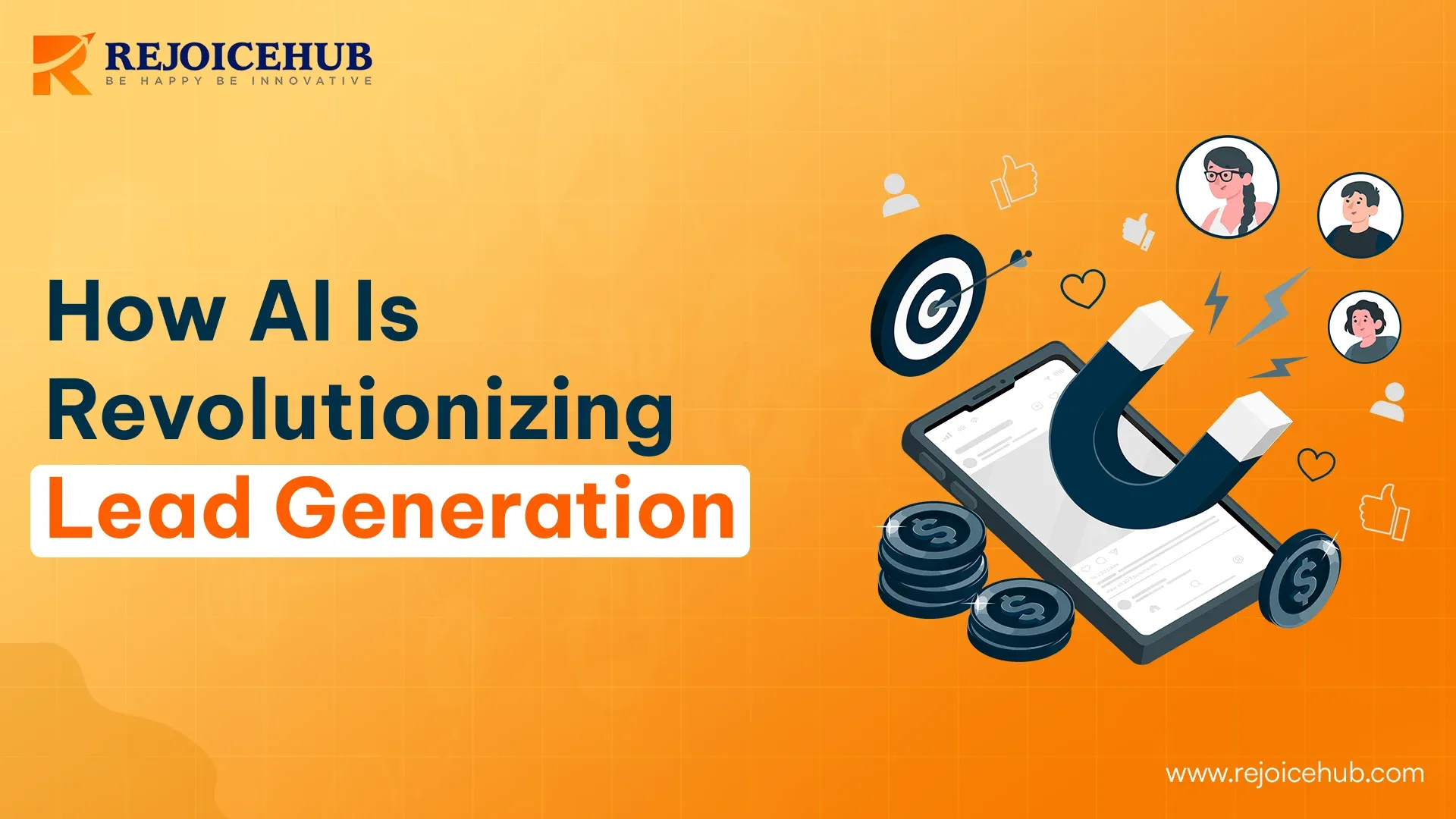
You too must be discussing with your friends during coffee time how businesses find new customers in today's fast-paced world, and your conversation must also be shifting towards Artificial Intelligence and why not, because its impact is being seen in almost all industries.
Your conversation may be casual, but it is the most critical operation for companies, and hence, in today's tech-driven world, companies are using AI a lot for lead generation.
If you, too, are curious about how AI tools are transforming lead generation, then in today's detailed article, we are going to discuss its different aspects, which will clear all your doubts.
At the end of this article, you will know how AI keeps customers connected with the brand and how it makes the business smarter and faster.
What Is AI Lead Generation?
Traditional methods rely on broad, manual strategies where sales teams send thousands of emails and calls, hoping they will get a lead.
But compared to traditional lead generation, AI lead generation platforms use machine learning, NLP, and predictive analytics to identify, attract, qualify, and nurture potential customers, all in a speedy and personalized way.
AI platforms and tools use massive datasets for lead generation to spot or identify customer behaviour, firmographics (like company size or industry), and intent signals (like website visits or keyword searches). Being proactive it has a high success rate.
For example:
AI tools track online activity and buying intent in leads very deeply, making it easier for the tool to understand the lead. This is why AI knows which lead is ready to buy a product or service and after knowing this, it sends a personalized mail to that lead.
Tools like IBM’s Watsonx Orchestrate or Salesforce Marketing Cloud are used a lot in the industry by businesses for repetitive tasks and focus on building real relationships.
How Does AI for Lead Generation Work?
The success rate of AI for Lead Generation remains high only when high-quality leads are pitched in an optimized way using all the data and algorithms. Let’s understand the AI for Lead Generation process in a little detail.
1. Data Collection and Analysis: AI platforms and tools first analyze datasets, which include a lot of behavioural data (like website visits or app usage), firmographic data (like company revenue or employee count), and intent data (like search queries or content engagement). AI distributes that data from its sales mindset in different sections.
2. Integration with CRM Systems: Most AI tools are integrated with customer relationship management (CRM); Salesforce or HubSpot are the best examples of this. It scores any lead with AI, divides audiences into different segments, and automatically provides personalized outreach to leads using this data.
For example: IBM Watsonx Orchestrate integrates with CRM, making it possible to automatically perform repetitive sales tasks.
3. Predictive Analytics and Scoring: AI analyzes historical data and uses that data to predict high-quality leads that are likely to convert. It provides score-based patterns of whether the lead visited the pricing page or downloaded the service brochure.
The traditional method uses a static rule-based system, and the same AI models adapt to new data and provide relevant scores accordingly.
4. Personalized Outreach: When AI analyzes a client’s lead activity, it sends personalized messages and emails to leads based on their behaviour, demographics, or industry.
For example, if someone is looking for jobs in the food industry on LinkedIn, AI tracks this data and sends them a personalized email that shows relevant job listings.
5. Automation and Engagement: AI-powered chatbots and virtual assistants can engage with leads in real time and answer questions from prospects 24/7. When leads are managed timely, lead conversion rates are also higher.
By combining all these steps, AI manages the entire lead generation process by itself, from finding prospects to converting them into customers. This makes you a sales expert who works 24x7.
Benefits of AI in Lead Generation
We have already learned enough to know how important AI-led generation is for today's times. Let us know what benefits it will bring to your business if you also want to use AI lead generation.
-
Always-On Nurturing and Responsiveness
According to research, businesses that respond to inquiries within one hour are nearly seven times more likely to qualify a lead compared to those who wait longer. AI makes this possible with 24/7 engagement through chatbots and automated email responders. No lead falls through the cracks, and prospects stay engaged before they go cold. Imagine a lead submitting a form at 2 a.m. AI’s got it covered, responding instantly with a personalized message.
In 2026, approximately, 30% to 60% businesses use chatbots or AI assistant on their service page, which drastically increases sales or lead conversion rates.
-
Efficiency Like Never Before
Traditional lead generation is so stressful, which includes manual data entry, endless research, and repetitive outreach. AI automates these tasks, cutting lead qualification time by up to 30%, according to Gartner. AI lead generation tools handle everything from lead scoring to routing, freeing sales teams to focus on strategy and relationship-building. This means lower costs per lead and the ability to scale outreach without hiring an army of reps.
-
Higher Lead Quality and Conversion Rates
AI doesn't just find leads, it finds the right leads. By analysing behavioural and intent data, AI identifies high-potential prospects with laser precision. For example, a Fortune 100 financial services company, through a partnership between Salesforce Marketing Cloud and IBM Consulting, boosted target conversion rates by 36–56% using AI-driven segmentation and personalization. Higher-quality leads mean higher conversion rates, which means more revenue with less effort.
These benefits aren’t just theoretical; they’re backed by real-world results. AI is like a trusty sidekick, making your sales and marketing teams faster, smarter, and more effective.
Also read: How AI Agents Are Transforming HR Automation in 2026
Key Features in AI Lead Generation Tools
Not all AI tools are created equal. To get the most out of AI lead generation, you need tools with the right features. Let's try to understand this in a little detail.
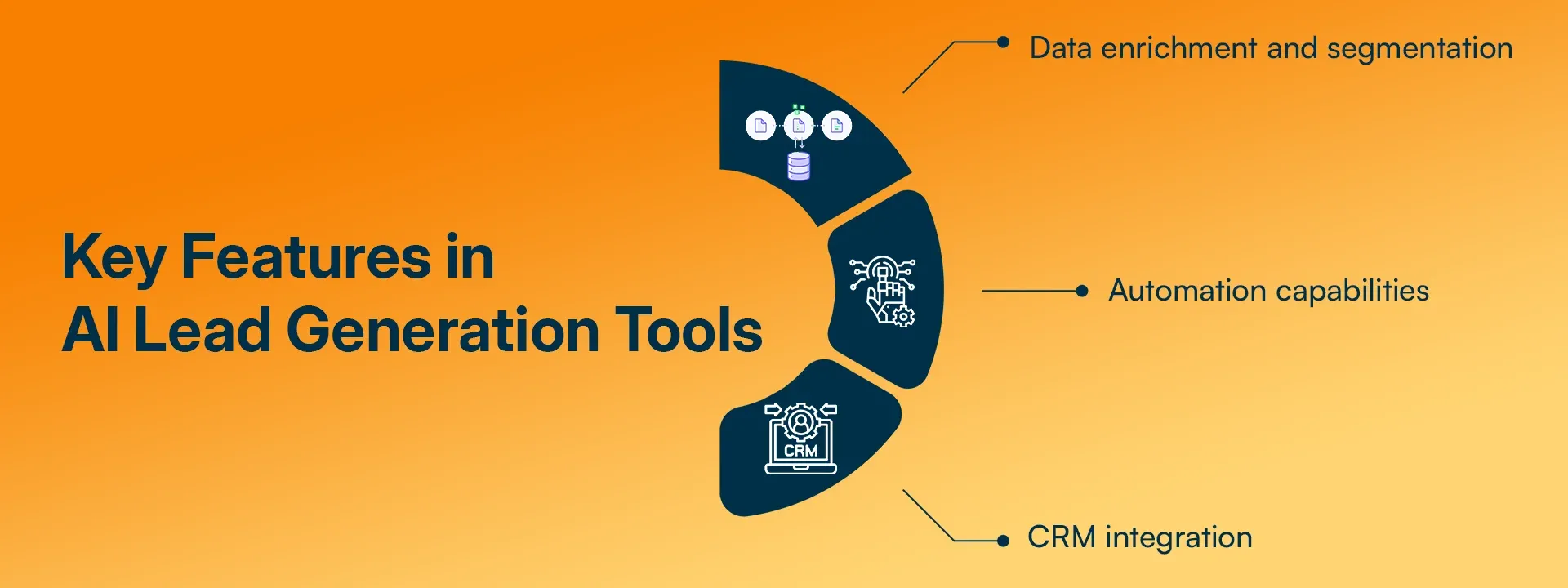
-
Data Enrichment and Segmentation
AI tools enrich lead profiles by filling in missing data, validating emails, and appending firmographics like company size or industry. This ensures your team has clean, actionable data. Segmentation takes it further, grouping leads by shared traits (like job role or purchase intent) for hyper-targeted campaigns. For example, AI can segment leads who’ve visited your pricing page multiple times, signalling they’re closer to buying.
-
Automation Capabilities
Currently, automation is the most important part of AI-led generation. AI tools automate repetitive tasks, such as lead scoring, email follow-ups, or scheduling demos. This frees up your team to focus on high-value activities like closing deals. Automation also ensures consistency, reducing human error and keeping your pipeline moving smoothly.
-
CRM Integration
A good AI tool should play nice with your CRM, whether it’s Salesforce, HubSpot, or something else. Seamless integration means real-time data syncing, so sales reps always have the latest lead scores and insights. Basically, AI lead generation tools integrate with CRMs to automate workflows and provide personalized experiences at scale.
AI Lead Generation Strategies
Now that we know what AI can do, let's talk about strategy. Here are the top ways to leverage AI for lead generation success:
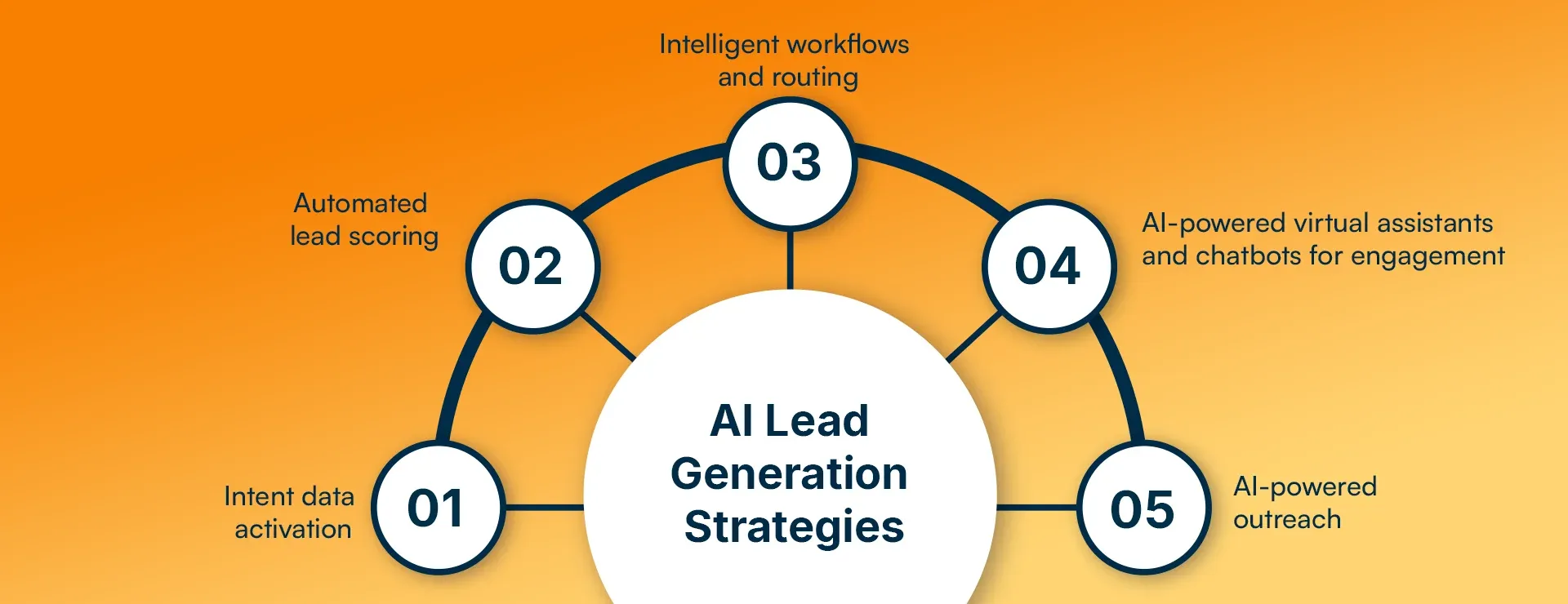
1. Intent Data Activation
AI can spot early signs of purchase intent by analyzing signals like keyword searches, website visits, or content engagement. For example, if a lead searches for “cloud software solutions,” AI can trigger a targeted email campaign before they even fill out a form. This proactive approach shortens sales cycles and catches leads when they’re most engaged.
2. Automated Lead Scoring
Forget static, rule-based scoring, AI-powered models analyze historical CRM data, behavioral signals, and intent indicators to assign dynamic scores to leads. These scores evolve as new data comes in, ensuring your team focuses on high-fit prospects. For instance, a lead who downloads a case study and visits your pricing page might get a high score, signalling it’s time for a sales call.
3. Intelligent Workflows and Routing
AI lead generation tools workflows based on lead behaviour and score. High-intent leads might go straight to an account executive, while lower-intent leads enter a nurture sequence. This ensures leads are handled efficiently, boosting conversion rates without overwhelming your team.
4. AI-Powered Virtual Assistants and Chatbots for Engagement
AI chatbots have come a long way from “Hi, how can I help you?” Modern AI agents can qualify leads, answer complex questions, and even schedule meetings. They're available 24/7, ensuring no lead goes unanswered. Plus, they can boost revenue by 7–26%, according to studies, by engaging leads in real time.
5. AI-Powered Outreach
AI crafts personalized emails and messages based on a lead’s behaviour, firmographics, and past interactions. It can optimize subject lines, predict the best send times, and adjust content dynamically. For example, platforms like Editpad use generative AI to draft emails that match your brand’s tone, making outreach feel personal without the manual effort.
These strategies aren’t just theoretical; they’re proven ways to supercharge your lead generation efforts with AI.
Implementing AI in Your Lead Generation Process
Let us know how you can use AI lead generation in your business, and you should use a local AI lead generation partner in your business, so that you can also execute lead generation automatically.
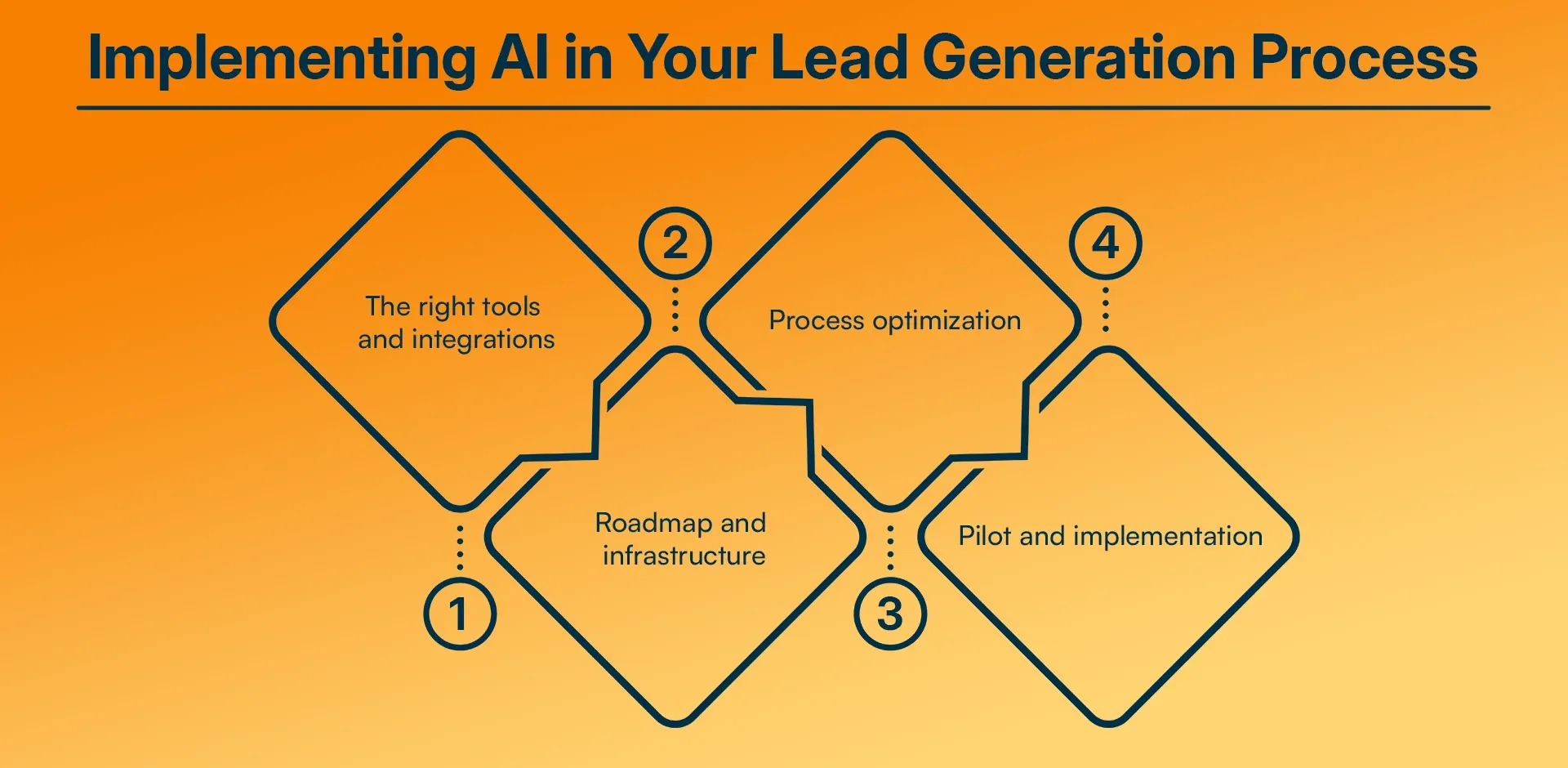
1. The Right Tools and Integrations
Start by choosing tools that align with your tech stack and business needs. Look for platforms that integrate seamlessly with your CRM and offer features like lead scoring, automation, and analytics. Involve your IT team early to ensure compatibility and security.
2. cRoadmap and Infrastructure
Before diving in, map out your current lead generation process. Identify pain points like slow response times or low conversion rates, where AI can make a difference. Then, assess your data infrastructure. AI thrives on clean, structured data, so fix any CRM gaps or silos.
3. Process Optimization
Train your team to work alongside AI. For example, if AI generates lead scores, teach sales reps how to interpret and act on them. If you're using chatbots, ensure your team knows how to take over when a lead is handed off. Continuous monitoring is crucial to track performance metrics and gather feedback to fine-tune your AI models.
4. Pilot and Implementation
Start small with a pilot project, like deploying a chatbot on a small segment of your website or testing AI lead scoring alongside your existing system. This lets you validate ROI and iron out kinks before scaling up. Expect a tuning period. AI models often need adjustments to deliver optimal results.
By following these steps, you’ll set your business up for AI-driven success without major disruptions.
Also Read: The Role of AI Agents in the Future of Business Automation
Measuring the Success of AI Lead Generation Efforts
How do you know if your AI lead gen efforts are paying off? It's all about tracking the right metrics:
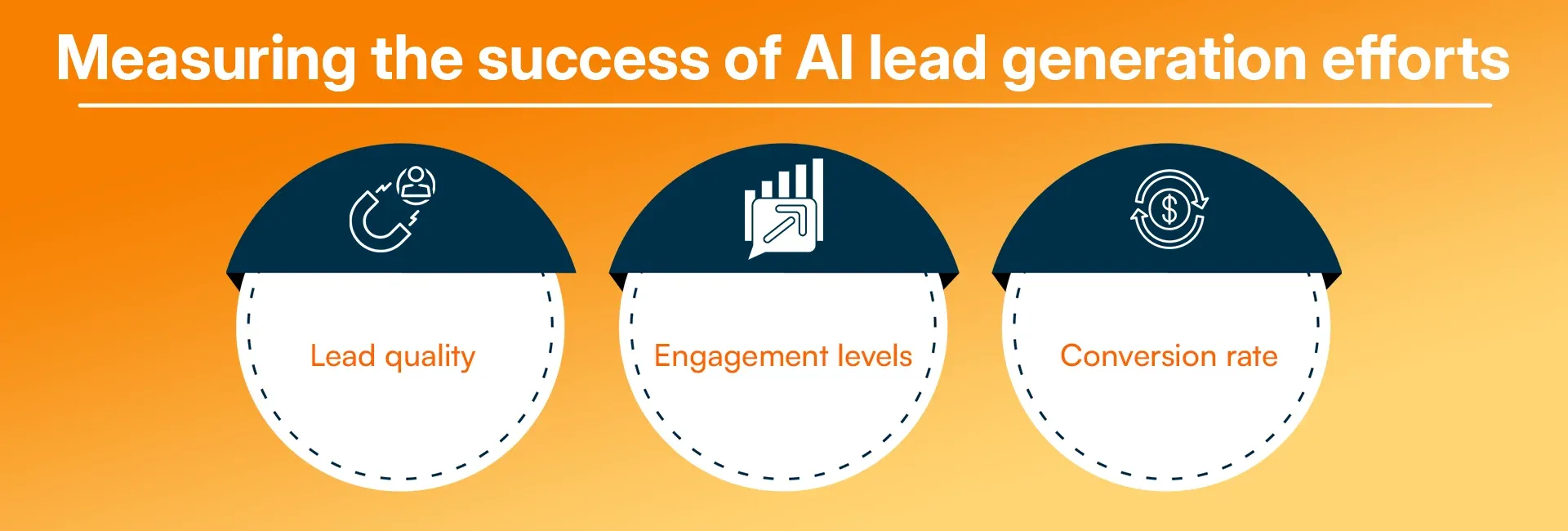
-
Lead Quality
AI should deliver higher-quality leads that fit your ideal customer profile. Measure this by tracking metrics like lead-to-opportunity conversion rates or the percentage of leads that match your target criteria.
For example, AI-driven segmentation can increase lead quality by ensuring you’re targeting the right audience.
-
Engagement Levels
Are leads interacting with your campaigns? Monitor metrics like email open rates, click-through rates, and chatbot engagement rates. AI-powered outreach should drive higher engagement by delivering relevant, timely messages.
-
Conversion Rate
The ultimate goal is to turn leads into customers. Track conversion rates from lead to opportunity to closed deal. AI’s ability to prioritize high-intent leads and personalize outreach should boost these numbers significantly.
By focusing on these metrics, you’ll get a clear picture of AI’s impact on your lead generation efforts.
Challenges and Considerations in AI-Powered Lead Generation
As we know that Artificial Intelligence is still evolving, hence there are many flaws in AI tools, so it is very important for you to know that if you use AI generation in your business, then it may bring challenges in your way, so that you are prepared for it in advance.
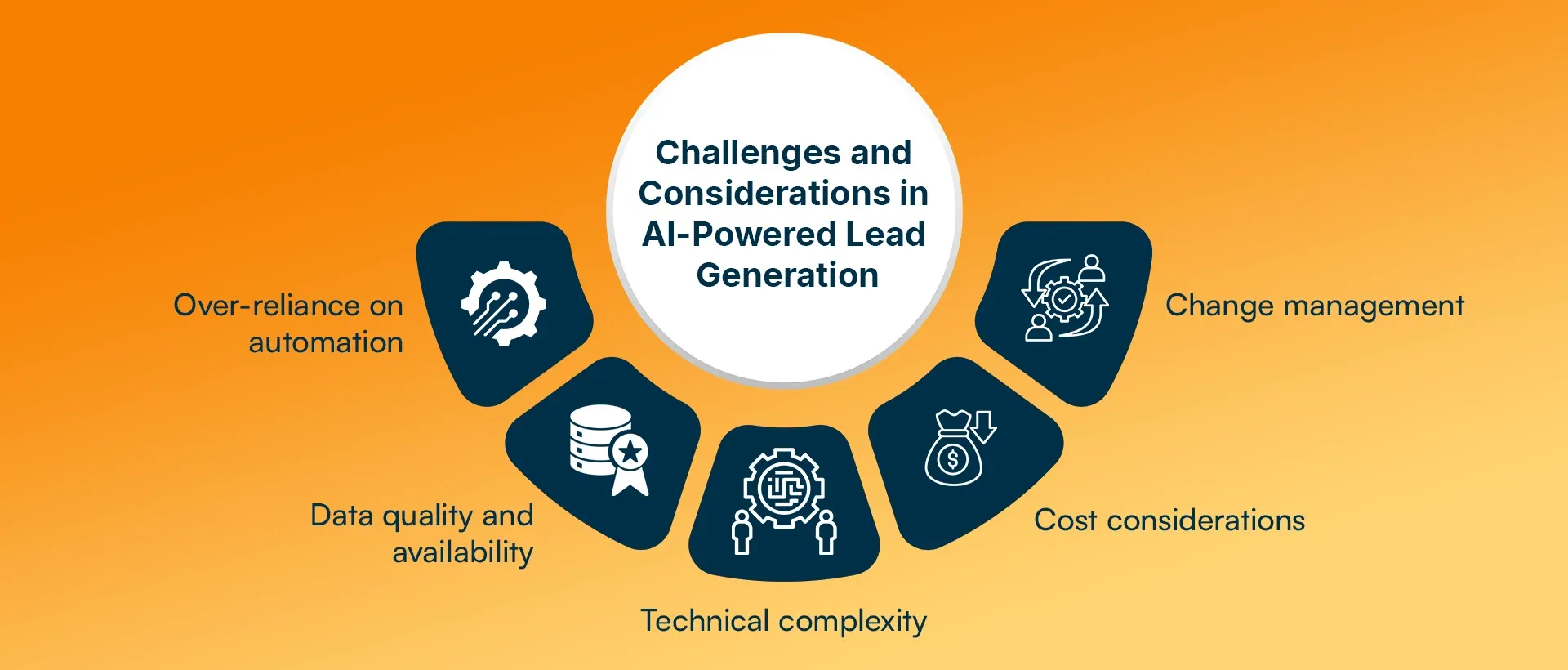
1. Over-Reliance on Automation
AI can streamline processes, but it’s not a replacement for human judgment. Over-relying on automation can lead to generic messaging or missed opportunities. Keep humans in the loop for creativity and relationship-building.
2. Data Quality and Availability
AI is only as good as the data it's fed. Incomplete CRM fields, inconsistent tagging, or siloed data can lead to inaccurate predictions. Invest in a universal data layer to centralize and standardise your data, as Scott Brinker recommends.
3. Technical Complexity
Integrating AI with your existing tech stack can be tricky. If your AI tool doesn’t sync with your CRM in real time, sales reps won’t get the insights they need. Plan integrations carefully and involve IT from the start.
4. Cost Considerations
AI tools aren't cheap, and ROI isn't instant. AI lead generation is a long-term investment; many factors impact the overall profit which including setup, maintenance, and training costs. Always start with low-complexity projects to demonstrate quick wins. This builds confidence and justifies further investment. For good ROI, always prefer an AI solution partner like RejoiceHUB.
5. Change Management
AI changes how teams work, which can cause friction. Sales reps might need to shift from manual qualification to engaging warm prospects, while marketers may rely more on predictive models. Clear communication and cross-functional alignment are key to smooth adoption.
By addressing these challenges proactively, you’ll maximize AI’s benefits while minimizing headaches. And you should also try to train your staff to handle all types of situations.
The Future of AI in Lead Generation
Start your AI lead generation, because the future of AI lead generation is the very next level. In the next 3–5 years, we’ll see some mind-blowing trends:
-
Autonomous AI Agents: Imagine AI agents that don’t just assist but act independently, researching prospects, initiating contact, and even scheduling meetings. These “fleets” of AI agents could handle entire lead-gen workflows, freeing up humans for strategic tasks.
-
Voice, Visual, and Ambient AI: Lead generation will move beyond emails and websites. Voice interfaces, visual analytics, and ambient AI (like smart assistants embedded in everyday devices) will create new ways to engage leads. That's the reason why most businesses use automated chatbots on their website or service page, so that they can convert this lead into a paid buyer.
-
Buyers’ AI Assistants as Gatekeepers: Many research suggests that soon, buyers might use AI assistants to research vendors and screen marketing messages. Brands will need to optimize content for these algorithms, ensuring it’s parseable and relevant. It’s like marketing to machines as much as humans. So if you are a startup founder, it's very important to adapt to this change, if you want high leads for your product or services.
-
Hyper-Personalization at Scale: AI will take personalization to new heights, crafting messages tailored to a lead’s exact needs, timing, and preferences. Think emails that feel like they were written by a close friend, delivered at the perfect moment. By personalisation, the lead success rate reaches 26%, so you can imagine the power of personalisation.
Conclusion
AI lead generation isn’t just a trend; it's a revolution. By leveraging machine learning, NLP, and predictive analytics, businesses can find high-quality leads faster, engage them with personalized outreach, and convert them with unmatched efficiency.
Always keep in mind success requires clean data, strategic implementation, and human oversight. If you want to implement an AI lead generation system for your business, then you can contact reputable and experienced firms like RejoiceHub, which provide you with the best solution and support for implementation.
As AI evolves, we’ll see autonomous agents, immersive experiences, and hyper-personalized campaigns reshape how businesses connect with customers.
Frequently Asked Questions
1. Can you use AI to generate leads?
Absolutely, AI automates tasks like lead scoring, prospect identification, and personalized outreach. It analyzes massive datasets to find high-intent prospects, speeding up qualification and cutting costs.
2. Can ChatGPT lead generation?
ChatGPT can power chatbots, automate content, and qualify leads through conversation. It’s not a full lead gen system, but it shines when integrated with CRMs and governed data environments. Human oversight ensures brand alignment.
3. How does AI qualify leads?
AI analyzes behavioural, demographic, and intent data of users to predict conversion likelihood. It scores leads in real time, updates dynamically, and prioritises high-potential prospects using tools like predictive analytics and scoring engines. If CRM is automated, it can also automatically send emails to leads.
4. How much does AI lead generation cost?
The cost of AI lead generation can range from hundreds to thousands, depending on what your lead generation partner company is, whether your leads are paid or organic or how many staff are handling lead management, and many different factors depend on how much ROI you can get from AI lead generation.
5. Can small businesses use AI for lead generation?
Yes, companies like HubSpot’s provide free CRM or Chatbots, so small businesses also use it for personalization or lead capture, so they can pitch their leads with personalization.
6. What’s the difference between AI agents and traditional chatbots?
As we know traditional chatbots give scripted responses and are suitable only for basic tasks. Whereas AI agents adapt the workflow and target complex leads accordingly.
7. How do I ensure AI lead generation complies with privacy laws?
If you are concerned about privacy laws, you should try to follow compliant guidelines of the platform or system you are using and regularly audit to maintain it so that your business can meet GDPR/CCPA standards.
